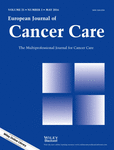Does labelling a rare cancer diagnosis ‘good’ affect the patient's experience of treatment and recovery?
Abstract
Doctors sometimes tell patients with rare but highly treatable cancers that they have ‘good’ cancer which some patients have found unhelpful, but this has been little explored. The aim of this study was to explore how patients reacted to being told they had a ‘good’ cancer. Qualitative interviews were carried out with 25 people with rare but prognostically favourable cancers who had received treatment at two hospitals within a cancer network. Results showed that despite good treatment outcomes, patients are still very shocked to hear the word cancer and react in similar ways to those with other forms of cancer. The potential effects of treatment should be recognised as having a detrimental effect on patient well-being whatever the prognosis. We should therefore avoid using ‘good’ and ‘cancer’ in the same sentence. In addition, the impact on all family members should not be underestimated. The data can be used to improve clinical practice and improve support for people affected by cancer.




